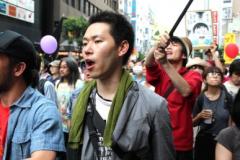
We were both in Japan when the earthquake on March 11 occurred, and we then decided to go back to Germany when the first reactor of the Fukushima power plant blew up, because we did not feel safe in Japan.
However, when we heard about the first anti-nuclear protests that were taking place in Tokyo a couple of weeks later, we were aware of the historical importance of those protests. Being a student of Japanese Studies, I, Julia Leser, had already done some research on Japanese protest culture and I therefore knew that street protests are a rare sight in Japan. Further, comparing the fragmentary media coverage in Japan with the international media which was stereotyping the 'brave' and 'stoic' Japanese, we felt the urge to report about what was going on in Japan.
We wanted to analyze those new protests in its historical and social context and give those people opposing nuclear power an opportunity to talk about their struggle. So we decided to go back to Tokyo and make a documentary about the current anti-nuclear movements.
During May and June 2011, we have filmed at demonstrations and talked with the activists who organized them. We also talked with intellectuals, social and political scientists, about the magnitude of the current protests.
During these months, we met a lot of inspiring people and got heaps of interesting footage of this new-forming movement, which seems to combine so many groups and organizations and may cause a major shift within Japanese politics and society. With RADIOACTIVISTS, we captured the spirit of this momentum, showing the challenges and triumphs of a movement of great historical significance.
Julia Leser and Clarissa Seidel





